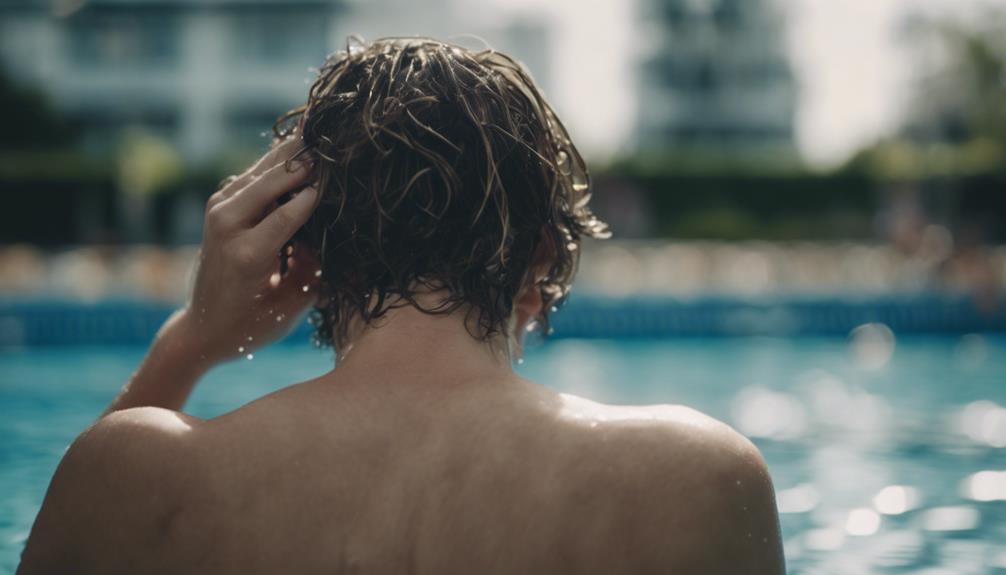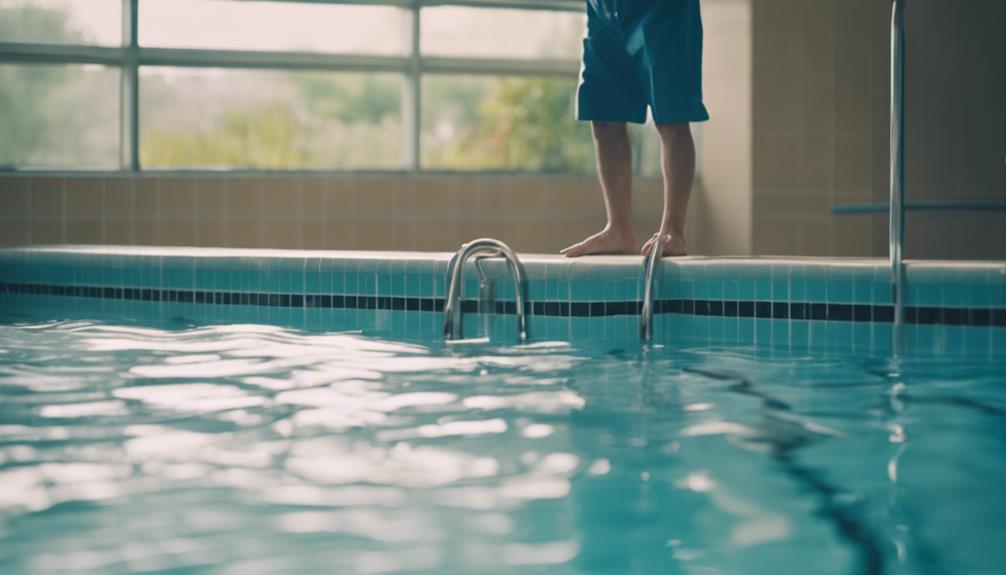You know, you won’t catch nits from swimming pool water. Those tricky critters like to hitch a ride through close contact, not in the splish-splash of the pool. They need to cozy up near your scalp to set up camp. So, no worries about nits lurking in the water while you’re doing your best cannonball! If you want to know more about these sneaky nits and how to keep them at bay, stick around. There’s some interesting info waiting just around the corner.
Key Takeaways
- Nits are unlikely to spread from pools.
- Nits require warmth near the scalp to survive.
- Transmission risks of nits from pools are minimal.
- Direct head-to-head contact poses a higher risk.
- Prevent nits by avoiding shared items.
Lice Transmission in Swimming Pools
Lice transmission in swimming pools is a rare occurrence due to the nature of how lice stay attached to the host. Those pesky critters like to cling on tight to your hair, even when you're doing the backstroke in the pool. The chances of lice spreading through the pool water are pretty slim. Instead, lice mostly hop from head to head through direct contact.
If you happen to share a towel, swim cap, or hairbrush with someone who has lice, that's when the little bugs might hitch a ride to your head. To prevent lice transmission in pools, it's essential to avoid sharing personal items like hair accessories and hats. Also, try to steer clear of rubbing your head against someone else's head while goofing around in the water.
Impact of Chlorine on Lice
Using chlorine in swimming pools doesn't effectively kill lice or nits, as these parasites have developed resistance to the chemical. Despite the belief that chlorine can zap away these pesky critters, lice are actually pretty resilient.
When lice come into contact with chlorinated pool water, they might get a bit stunned, but they quickly recover and continue on with their lousy business.
So, if you were hoping that a dip in the pool would magically rid you of lice, unfortunately, that's not the case. Lice can survive in pool water, hanging out and waiting for their next victim to come along.
This means that even if you take a plunge in a chlorinated pool, those clingy lice will most likely stick around for the long haul.
Survival of Lice in Pool Water
Swimming pool water does not effectively eliminate lice or their nits due to their resistance to chlorine. Even though chlorine is great for keeping pools clean, it's not a match for those pesky head lice. These little critters can actually survive in chlorinated water, but don't worry, they won't be swimming around looking for new heads to invade. Lice prefer to stay attached to the host's hair, so you won't find them freely roaming in the pool.
Let's take a closer look at how head lice behave in swimming pool water:
| Head Lice in Pool Water | Survival Mechanism | Spread via |
|---|---|---|
| Can survive in water | Stay attached to hair | Direct contact |
| Not killed by chlorine | Avoid floating around | Rare in pools |
Risks of Getting Nits From Pools

Have you ever wondered about the risks of getting nits from swimming pool water?
Let's chat about it!
We'll cover how pool water and nits don't really mix, the low chances of transmission, and some handy prevention tips to keep those nits at bay.
Pool Water and Nits
Nits are unlikely to be contracted from pool water due to their need for the heat and proximity of the human scalp to survive and hatch. These pesky lice eggs aren't great swimmers; they prefer to hang out close to the head where it's warm. So, while you splash around in the pool, worrying about nits in the water shouldn't be your top concern.
When it comes to nits, swimming in a pool isn't the main worry. The real risk comes from head-to-head contact with someone who's lice. Those nits love to stick to hair strands and aren't commonly found floating around in the pool.
Transmission Risks
The likelihood of contracting nits from pool water is minimal due to their dependence on human hosts for survival and hatching. While it might sound gross to think about nits in the pool, they need the warmth of your scalp to be happy and hatch.
So, taking a dip in the pool shouldn't give you nits – phew! The real risk of getting these little critters usually comes from close head-to-head contact with someone who's already infested. Nits stick pretty darn well to your hair, so they're not easily washed away in pool water.
If you want to swim worry-free, just remember to avoid sharing stuff like towels or hair accessories with others. That way, you can splash around without stressing about nits hitching a ride.
Prevention Tips
Minimize the risk of acquiring nits from swimming pools by practicing proper lice prevention measures.
When you're swimming, steer clear of close head-to-head contact with others.
Remember, nits are pesky critters that like to stick to hair, so sharing items like towels and hair accessories can spread them around.
It's like a little nit party no one wants an invite to!
Prevention of Lice Spread
To keep those pesky lice at bay while enjoying the pool, remember to wear your swimming cap nice and snug. This simple step can help prevent lice from hitching a ride during your aquatic adventures.
And if lice do manage to sneak in, don't worry – there are effective treatments available to send them packing!
Hygiene Practices for Prevention
To prevent the spread of nits, prioritize good hygiene practices such as avoiding sharing personal items like towels or hair accessories. While swimming pool water isn't a common way for nits to spread, it's still important to take care of your hygiene.
Remember, nits mainly transfer through direct head-to-head contact, not pool water. So, after a fun day at the pool, make sure to wash your hair thoroughly with shampoo. Also, try not to share your hairbrush, comb, or hats with others to reduce the risk of spreading nits.
If you suspect nits, proper lice treatment and combing are vital. Use a fine-toothed comb to remove the nits from the hair shafts. This process may take some time, but it's crucial to ensure those pesky critters are gone for good.
Treatment Options for Lice
When it comes to addressing lice infestations, exploring effective treatment options is vital in preventing the spread of these pesky parasites. To treat lice, you can use over-the-counter or prescription treatments that come in shampoos, creams, or lotions. Make sure to follow the instructions carefully for the best results.
Additionally, combing your hair with a special nit comb is important to get rid of those stubborn eggs, known as nits. Remember to avoid sharing personal items like hats, brushes, or headphones to prevent spreading lice to others.
If you find that home treatments aren't doing the trick, consider seeking help from professional lice clinics. These clinics offer services to thoroughly remove lice and nits, reducing the chances of reinfestation. It's crucial to be diligent in your lice treatment to ensure a clean scalp and prevent further spread.
And while you're treating lice, it's best to avoid swimming to prevent any potential spread to others. Stay proactive in treating lice, and those pesky parasites will be gone before you know it!
Common Lice Transmission Routes
Lice primarily spread through direct head-to-head contact, making it the most common way these pesky critters move around. When it comes to lice, swimming in chlorinated water won't give you nits. These tiny insects don't detach from your hair and go for a swim in the pool. Nope, they're clingy little buggers that stick to your strands, so you won't find them floating around in the water.
To avoid getting lice, it's best to steer clear of close contact with others who've them. That means no sharing hats, brushes, or anything that touches the hair.
While lice can survive underwater for a short time, they won't be hanging out in the pool waiting to jump onto your head. So, feel free to enjoy your swim without worrying about these creepy crawlies lurking in the water.
Importance of Proper Lice Treatment
Proper lice treatment requires the use of specific medications to effectively eliminate both lice and nits. When dealing with these pesky critters, it's important to follow the recommended protocols to make sure they're gone for good.
Here's why proper lice treatment is so significant:
- Specific Medications: Using the right treatments is essential to getting rid of lice and nits effectively. These medications are designed to target these parasites and stop them in their tracks.
- Preventing Reinfestation: By following the recommended treatment guidelines, you can help prevent lice from coming back. Don't let those little buggers make a comeback!
- Lice Transmission: Remember, lice are usually spread through head-to-head contact, not from swimming pool water. So, focus on treating the source to break the cycle.
- Effective Elimination: Chlorine in pools won't do the trick. It's the specific lice treatments that will help you say goodbye to these unwelcome guests once and for all.
Consultation for Lice Infestations

Seeking professional consultation is vital when dealing with lice infestations to guarantee effective treatment and prevention strategies are implemented. Lice and nits can be quite bothersome, so it's important to get the right guidance.
When you consult a professional, they can provide you with expert advice on how to tackle lice infestations head-on. They'll walk you through the various treatment options available, ensuring you choose the best one for your situation.
Additionally, they can enlighten you on lice prevention techniques to stop these pesky critters from coming back. Remember, lice spread mainly through direct head-to-head contact, so understanding how to prevent this is key.
Frequently Asked Questions
Can You Get Nits From a Swimming Pool?
You won't catch nits from a swimming pool! These pesky critters need your cozy scalp to hatch and cause trouble, not the cool water of a pool.
Even if a nit decided to take a dip, it wouldn't turn into a full-blown louse without your head's warmth. So, splash worry-free!
Does Chlorine Kill Nits?
So, does chlorine kill nits? Nope, it doesn't! Those sneaky little nits, aka lice eggs, are like tiny superheroes that can withstand the power of chlorine in swimming pools. They attach firmly to hair strands and won't budge even if you take a dip in a pool.
Do Nits Float or Sink in Water?
Alright, so when it comes to nits and water, they're pretty clingy little critters. Nits are lice eggs that stick to your hair like glue. They're not the type to float or sink in water because they're firmly attached to your strands.
Can You Get Lice From a Swim Cap?
Wondering if you can catch lice from a swim cap? Nope, you're safe there! Lice don't typically hang out in swim caps or spread through them. They prefer direct head-to-head contact for a cozy stay.
Conclusion
So, can you get nits from swimming pool water? The answer is… drum roll please… no!
Phew, what a relief, right? While lice can survive in pool water for a short time, the chances of getting nits from swimming are slim to none.
Remember to practice good hygiene, avoid sharing hats or brushes, and keep an eye out for any signs of lice.
Stay safe, have fun, and enjoy your time in the pool!










